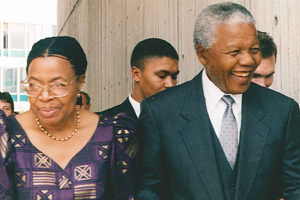
Nelson Mandela with his wife, Graça Machel, during their visit to our Colchester Campus
The Chair of the University of Essex’s Human Rights Centre has paid tribute to former South African President Nelson Mandela who died yesterday, describing him as “the moral giant who could bring true reconciliation to a country that had been so cruelly and arbitrarily divided.”
As a sign of respect the University flag will fly at half mast from tomorrow, Saturday 7 December, until the state funeral taking place on Sunday 15 December.
Professor Sir Nigel Rodley met Mr Mandela when he visited the University in July 1997 to accompany Graça Machel, who subsequently became his wife, and who was awarded an Honorary Degree in recognition of her work with the UN on children’s rights.
During the visit to Essex, President Mandela and Graça Machel were shown a display of work by the renowned Human Rights Centre. Sir Nigel said: “My late colleague Professor Kevin Boyle, who was then the Director of the Human Rights Centre, escorted President Mandela round our exhibition, of which I was custodian. Kevin introduced us, identifying me as the UN Special Rapporteur on the question of torture. We shook hands and Mandela stunned me by saying ‘The world needs more people like you’. I recovered fast enough to ask him where he thought we got our inspiration from, and he chuckled and patted me firmly on the shoulder.”
A few years later Sir Nigel took part in a human rights training course on Robben Island, where Mr Mandela had endured 27 years’ confinement. “We saw the cells of the political prisoners, including Mandela’s, and we knew about the indignities and brutalities meted out to the prisoners for much of their time there,” he remembered. “It defied imagination to understand how the genial, tolerant man I met could have emerged from that experience as the moral giant who could bring true reconciliation to a country that had been so cruelly and arbitrarily divided. I am privileged to have met him.”
Expert on South Africa in the twentieth century, Dr Jeremy Krikler of the University’s Department of History described Mr Mandela as a great man and “one of the great symbols of the twentieth century struggle for the rights of citizenship.”
Dr Krikler said: “Mandela was determined to relinquish power after only a single term as President – he was adamant about that – which makes him rare amongst world leaders. He was not averse to recognising the blemishes on his own side which is why he publicly recognised that human rights violations had taken place in ANC guerrilla camps. And he remained absolutely committed to reconciliation and an inclusive and rights-based notion of South African citizenship once he was in power. Not surprisingly, his term in office is generally seen as the most hopeful period of South African history.”
Dr Krikler added: “This is not to say that there are no criticisms to be made. As Mandela himself conceded, his administration was reticent (probably for cultural reasons) about tackling the issue of HIV in South Africa: this led to a policy of drift that was turned catastrophically into one of denial by Thabo Mbeki, the president who succeeded him. And there are many who feel that Mandela was curiously silent about repressive regimes in Africa, not least in Zimbabwe. Like all iconic figures, Mandela was not perfect.
“Nevertheless, his sacrifice, bravery, his abilities as a leader, and that colossal dignity and refusal to be embittered despite the persecution he suffered, give him global historical stature: Mandela stands with Martin Luther King and Mahatma Gandhi as one of the great symbols of the twentieth century struggle for the rights of citizenship.”
When President Mandela and Graça Machel visited Essex they were cheered by students and guests during their attendance at Graduation. They were also shown a display of work by the Children’s Legal Centre, an independent charity based at the University, and took an unscheduled walk around campus, meeting and congratulating many graduating students.
Ends
More information
For further information please contact the University of Essex Communications Office, telephone: 01206 874377 or email: comms@essex.ac.uk.